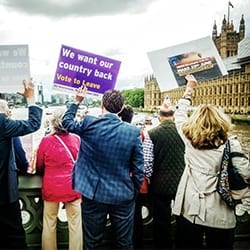The UK continues to swoon as it digests the domestic implications of the Leave vote, but for the rest of the world Brexit is more important as a sign of the times. It erased any remaining doubt that popular support for globalization has disintegrated. Having previously acquiesced to a free trade agenda — or having not paid attention — middle class voters across most advanced economies have awoken to three flaws in the standard case for further global integration. Fortunately, they are not irreparable.
The first and most obvious one flows from the well-known fact that that as economies integrate, some jobs will shift to lower-wage countries. Economists argue, and the evidence supports them, that the gains outweigh the losses even in higher-wage countries. But new research finds that there can be a lot of losers who experience substantial harm.
The standard pro-trade argument is that the winners can completely compensate the losers so everyone is better off. Influential pro-trade economist Gary Huffbauer of the Peterson Institute for International Economics admirably documents, however, the pitiful track record of the U.S. government at following through with compensation and adjustment measures.
These measures may not be easy to implement, but a more serious obstacle is that they would be “big government”-style policies. Ironically, the most ardent free trade enthusiasts are often the most opposed to schemes that would mitigate the impact on displaced workers. After several decades of trade policy that forgot about the small guy, we have only ourselves to blame if voters no longer trust that globalization benefits them.
The second flaw in the case for free trade is that, in many industries, companies get more efficient as they get bigger. Once a few firms get big enough, smaller, less efficient firms cannot compete. A country can therefore subsidize select exporting firms to grow until they drive foreign competition out of business, and the gains from their market dominance more than pay for the cost of the initial subsidy. Anti-dumping measures have not proven effective at blocking this strategy because governments have so many different means of subsidizing firms.
The advanced economies do not generally play this game because their leaders fear the corrosive political forces that picking winners produces. But as advanced economies have lowered trade barriers, several generations of Asian economies have grown using these strategies. They have kept their own markets relatively closed to competition, actively supported select firms and industries, and kept their currencies artificially low. This promoted stability in Asia and alleviated vast poverty, but was costly for U.S. and British manufacturing.
The third flaw in the case for globalization lies in the flexibility it requires of people to move and to accept new neighbors. Mainstream British voters seem to resent sharing their country with folks from the rest of the EU. Donald Trump capitalizes on similar sentiments in the U.S., as do anti-EU parties across continental Europe. The Japanese don’t even try.
People do not want to be the new neighbors, either. This matters because workers benefit most from the competition that globalization induces if they are willing to follow the jobs. Americans are more willing to move to another town than people in almost any other country. Yet the research cited above finds that failure to move out of areas where jobs have left is one big explanation for persistent bad outcomes for displaced workers. In the EU, even moves that do not entail crossing a national border are more than twice as rare as in the U.S.
Inflexibility to moving is a human reality that has been overlooked by both economists and policymakers, yet it represents a significant obstacle to allowing more people to benefit from free trade. Voters are now emphasizing that we overlook this reality at our peril.
The solution to these flaws is not to abandon the free trade agenda. It is still true that the benefits outweigh the costs, even for advanced economies. Instead, policymakers must pay much more attention to measures that take these three flaws seriously. Many solid plans have been proposed for compensating or facilitating the adjustment of displaced workers. (Huffbauer describes some, and this one by Charles Murray is thought-provoking.) Those who advocate free trade should take more seriously the responsibility to fund and implement these measures.
The debate about the Trans-Pacific Partnership also opened up a healthy debate about exchange rate manipulation, subsidizing industrial policies and fair play. We can no longer gloss over the importance of requiring level playing fields as a prerequisite to free trade.
Making humans more mobile may prove tougher to do. Better programs to compensate displaced workers can help. Economic resentment fuels anti-immigrant sentiment.
Let Brexit be a wake-up call that the public does not want the same old approach to globalization. Free trade is salvageable, but it can no longer mean only lowering barriers. Integration must include robust measures for displaced workers and fair play, so its benefits are more widely appreciated.
Russell Green is the Will Clayton Fellow in International Economics at the Baker Institute.
